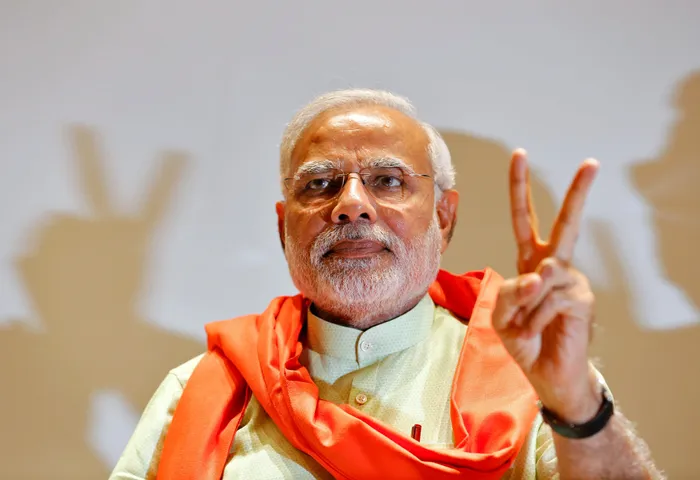The 21st century’s most successful post-colonial economic transformation
Analysis

UNDER Prime Minister Narendra Modi’s leadership, India is pursuing an ambitious vision to become a fully developed nation by 2047, its first Centenary year of independence from British colonial rule.
Image: Amit Dave/Reuters
UNDER Prime Minister Narendra Modi’s leadership, India is pursuing an ambitious vision to become a fully developed nation by 2047, its first Centenary year of independence from British colonial rule.
This transformative agenda, termed “Viksit Bharat” (Developed India), aligns with the parallel mission of “Aatmanirbhar Bharat” (Self-Reliant India), an India which seeks to propel India into one of the world’s fastest-growing economies, prosperous and with a united national agenda.
Equally significant is Modi’s symbolic and substantive shift away from India’s colonial legacy. The renewed emphasis on the name “Bharat”, a cultural term rooted in India’s ancient scriptures, language and indigenous identity, reflects this cultural reawakening.
By reclaiming Bharat, even in recent G20 gatherings, India is not only honouring its pre-colonial heritage but also asserting a civilizational continuity that predates foreign domination.
This socioeconomic decolonial transition by Prime Minister Modi has engineered what scholars are calling “the most successful case of post-colonial economic transformation in the 21st century”.
Articulated by Professor Anil Trigunayat in his assessment of India’s development trajectory: “India has in the past eleven years systematically dismantled colonial economic patterns while building what Prime Minister Modi terms a ‘New India’, one that draws strength from the past while embracing technological modernity.
This analysis by Trigunayat succinctly elucidates how India transitioned from being among the “fragile five” economies in the world to becoming the world’s fourth-largest economy in just one decade. What has anchored this phenomenal ride is what Modi describes as rejecting the “slavish mentality” of colonial governance.
As of date, India has repealed 1 550 archaic colonial-era laws, the country has leap-frogged from 130th to 63rd in the World Bank’s Doing Business Index, compounded by an explosive growth of just 500 startups to 1.6 million today and 118 unicorns. These are not mere economic indicators but evidence of a fundamental rewriting of development paradigms.
At the heart of India's transformation lies its digital revolution, which Trigunayat identifies as a key driver of inclusive growth. The creation of the world’s most sophisticated Digital Public Infrastructure, known as the JAM Trinity (Jan Dhan bank accounts, Aadhaar digital IDs, and Mobile connectivity), has enabled India to enable direct monetary benefit transfers to 800 million citizens.
During the Covid-19 pandemic, this system allowed India to deliver emergency relief with unprecedented efficiency while simultaneously exporting these digital solutions to other developing nations.
For Africa, which continues to rely on donor-prescribed technological solutions, India’s example demonstrates how digital sovereignty can become the foundation for broader economic independence.
India’s climate leadership, as highlighted in Trigunayat’s work, provides another critical lesson in post-colonial development. While Western nations often prescribe climate solutions that maintain global power imbalances, India has charted its own course.
The International Solar Alliance now includes over 120 member countries and represents what Trigunayat calls “the most consequential Global South initiative since the Non-Aligned Movement”.
With 50% of installed electricity capacity now from non-fossil sources and the recent creation of the Global Biofuels Alliance, India proves that environmental sustainability and rapid development are not mutually exclusive when nations define their own pathways.
Who could forget the tension at the 29th UN Climate Change Conference, commonly known as COP29, which was held in Baku, Azerbaijan, from November 11 to 22, 2024. India tabled the following discussion points at the conference:
- Monetisation of Carbon debt owed by developed countries to developing countries for their overuse of the global carbon budget.
- Unilateral coercive measures that restrict trade flows and restrict countries from accessing equitable development opportunities
- Intellectual property rights on green technologies, which hinder their free and scalable access to developing countries
- How inequality continues to be perpetuated in the climate discourse
- The choices of citizens in developed countries are sacrosanct versus the costs imposed on the citizens of developing countries due to transition
This boisterous call for the developed nations to be held to account for climate finance and to not only limit the debate to technical and economic matters but to include justice, equity, and fairness was India’s Damascus moment in the decolonial agenda.
The Indian agricultural sector also offers perhaps the most striking example of India’s decolonial approach. Trigunayat documents how farmer income doubling initiatives, soil health cards, and the world’s largest food security program have increased grain production from 252 million to 332 million tonnes while feeding 800 million citizens.
India’s success demonstrates that food sovereignty begins with trusting indigenous knowledge systems while strategically adopting modern technologies.
In foreign policy, Trigunayat observes India’s emergence as what he terms a “rule-shaper rather than rule-taker”. From simultaneous engagement with G7, G20 and BRICS to leadership in vaccine diplomacy during the pandemic, India has shown that strategic autonomy in international relations is achievable. This multi-alignment approach, combined with initiatives like “Make in India”.
As Trigunayat’s analysis makes clear, India’s transformation required more than policy changes — it demanded what Modi calls a “mindset revolution”. This involved recognising that true independence means developing indigenous solutions to indigenous problems, whether in digital governance, climate action, or agricultural development.
The results, from space exploration achievements to becoming the world’s fastest-growing major economy, speak for themselves.
What emerges from Trigunayat’s work is not just the story of India’s rise, but a blueprint for how the Global South might finally achieve the economic sovereignty that has remained elusive since the formal end of colonialism. The tools for true independence exist — India has proven they can work. The remaining variable is political will.
* Phapano Phasha is the chairperson of The Centre for Alternative Political and Economic Thought.
** The views expressed here do not reflect those of the Sunday Independent, IOL, or Independent Media.